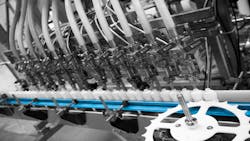How Cloud ERP Tackles the Unique Challenges Facing Food and Beverage Manufacturers
Recent headlines about more food recalls means increased high stakes situations when it comes to managing your business information. Lack of process visibility can result in a public health safety risk. In spite of these risks, your profitability demands that production experiences little to no downtime while ensuring high quality products.
You may have heard about the cloud but may have pushed aside the idea that it could benefit your business. It’s only for social media, right? Actually, process manufacturers in the food and beverage industry are reaping significant benefits from the cloud and leaving laggard competitors in their dust. Cloud ERP for process manufacturing is here and it’s bringing unprecedented transparency with visibility from the plant floor to the top floor. High resolution traceability (the complete genealogy of any product), batch recipe management, inventory optimization, and automated compliance and quality management are only a few of the critical business issues being addressed by cloud ERP for food and beverage manufacturers.
Know More about Your Plant Floor From Your Top Floor
Food and beverage manufacturers have found that full integration of real-time operational data collected from the plant floor (manufacturing operations) and made available to the top floor (business management) is key to reducing costs, streamlining operations, and improving customer satisfaction.
Leveraging a manufacturing ERP system to effectively automate a process not only results in efficient, repeatable production processes, but it can also create error-proof quality processes that enforce regulatory compliance and documentation. When business management has visibility into manufacturing operations, issues can be resolved more quickly or even be addressed before they result in a quality leak or supply chain disruption.
With cloud ERP, you free up IT resources to become more strategic and work with operational technology (OT) experts to focus resources, eliminate waste, improve quality, and work more efficiently. Connected manufacturers are able to connect their entire supply chain and even monitor operations from any mobile device. Today, there is no reason to be unaware of what is happening on your plant floor, regardless of where you are.
Track and Trace Both Ingredients and Finished Goods
Food and beverage manufacturing businesses must trace lot information for both ingredients coming from suppliers and finished goods going to customers to react to potential problems quickly and with precision. You need a system that enables you to accurately track individual lots, bins, or packages as they flow through your supply chain so you can quickly react to a food safety issue or recall and ideally prove you are not culpable or minimize your exposure.
With cloud ERP you can access detailed historical information related to supply chain, production, inspection, genealogy, and usage. And because it’s in the cloud, users can instantly track the genealogy of any product, at any time and from anywhere with an Internet connection. Imagine being in a customer’s office and identifying the source of a specific ingredient just by logging on to your system and finding the information in a matter of minutes (versus the four hours required by the U.S. Food and Drug Administration (FDA).
Get a Deeper Look into Batch Recipes to Mitigate Risks
Do you know of any possible allergens in your batches? Before they go into finished goods? What about a recall of a specific ingredient in your batch recipe? Without the ability to track all data related to batch recipes you could face an expensive and time-consuming recall of your products or worse – loss of a customer. And if you are the one holding the bag, your brand can suffer dramatically.
Descriptive information, technical properties, quantities, costing information, notes, and history, in user-definable units for your batch recipes gives you the insight to avoid risks. If your company produces dozens or hundreds of recipe combinations, the amount of data can be extensive. By relying on a cloud ERP solution that accurately identifies and tracks information for every ingredient in every batch produced by you and/or your suppliers–with all data online and accessible at all times—you won’t have to worry.
Hone Your Inventory Accuracy Toward 100 Percent
Excess inventory is more than just wasted cost. When perishable raw materials are involved, surplus inventory and delays in processing can also lead to quality and safety issues.
You may think it’s virtually impossible to reach 100 percent inventory accuracy but nothing is impossible with the right system in place. One process manufacturer in the food and beverage industry uses cloud ERP and makes exactly what it needs shipping on time with 99.7 percent inventory accuracy. This company’s ERP system includes traceability features and materials requirements planning (MRP) functionality, enabling the manufacturer to plan just-in-time delivery of ingredients or raw materials.
Detailed traceability, both upstream and downstream through production to shipment helps its users achieve higher profits by minimizing inventory holding costs and reducing delays caused by lack of raw materials.
Comply without Compromise or Disruption
Keeping up with and ensuring compliance can be its own full-time job. Rather than simply maintaining compliance documentation, you should create business processes that result in compliancy and enforce operational rigor. Your systems should help make this process as streamlined and effective as possible.
U.S. FDA mandates including hazard analysis and critical control points (HACCP) planning, and other requirements mandated by the Food Safety Modernization Act (FSMA) must be designed into the automated processes. A cloud-based ERP system should support HACCP, process flow charting, statistical process controls, electronic signatures, and more to move from a reactive to a preventative safety culture.
You don’t need another system that becomes a liability or additional IT burden. You need a cloud-based ERP solution that you don’t need to think about—except when you see drastic improvements in efficiency, production, and customer satisfaction. Then your CEO can think about how he includes it in your annual report!
Curious on how cloud ERP can help your process manufacturing business? Download the white paper, The Perfect Solution for Food and Beverage Manufacturers.
